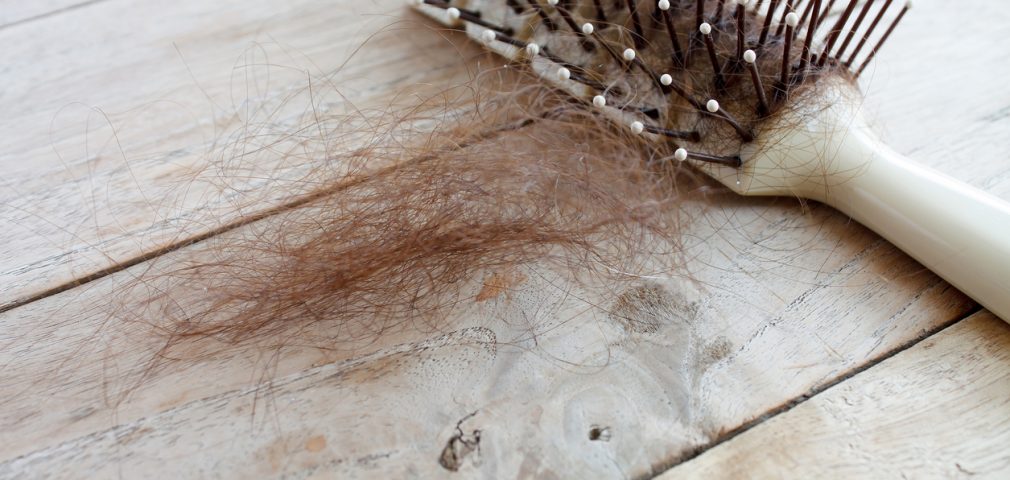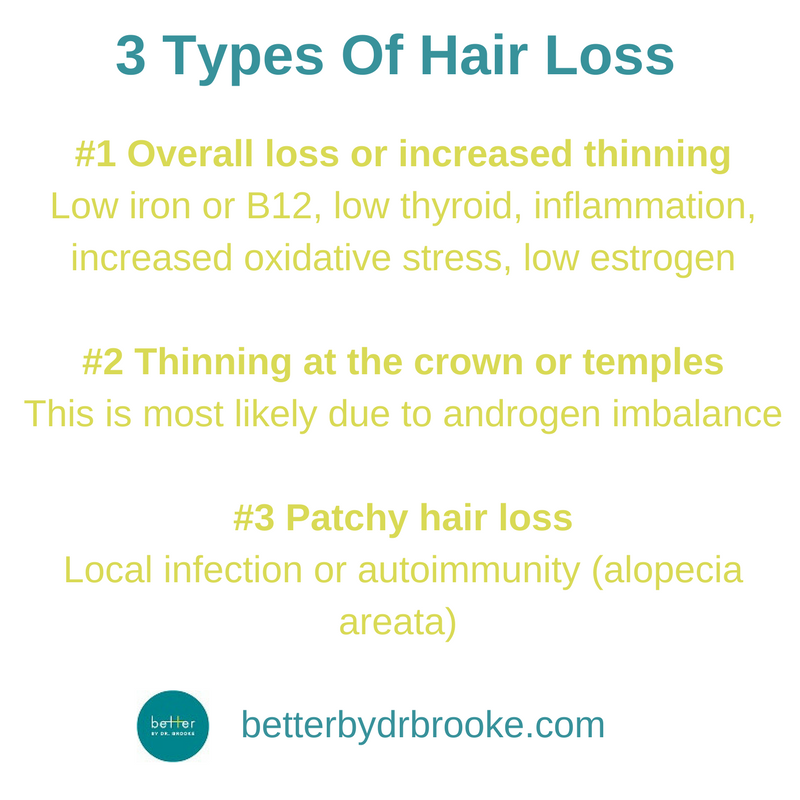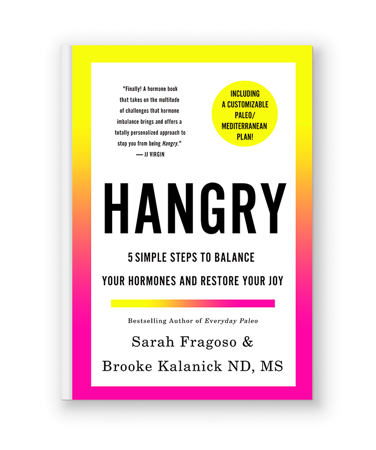
Losing hair is among the most distressing of all symptoms I see in my office. It can create an extreme amount of stress and guess what’s bad for hair loss? stress. But that’s just one of the multiple reasons you could be losing your tresses.
Most women that are concerned about hair loss are taking biotin, collagen or a host of other hair/skin/nail supplements. Which is fine, most of these nutrients are great for stronger hair and we want any new growth to be strong.
But we always have to ask: why is it falling out in the first place?
It may not be a biotin deficiency. In fact I’d venture to guess it’s not low biotin at all. Biotin, collagen and other pro-hair nutrients are helpful as they nourish the new hair that grows in but job one is figuring out why it’s falling out and treat that ASAP.
So before you spend more hard earned cash on a miracle hair supplement let’s talk about some root causes (wow, bad pun huh??) of your hair loss.
First, a little hair growth 101:
Normally we have about 120,000-150,000 strands of hair and shed about 100 hair per day.
Usually, at any one time, about 90% of those hairs are in a growing phase, growing by about 1/2 inch each month. This phase lasts for two to three years.
When that time is up the hair will go into a resting stage. This “rest” lasts for 3 to 4 months before that hair falls out and is replaced by a new one.
When this process is disrupted you end up with thinner hair, increased hair loss, a failure to regrow new hair and all in all a super sad experience! No one love losing their hair and it’s such a huge source of upset for women I work with but I’ll be honest, it is often the last thing to change as we work through getting your hormones and metabolism more balanced. It’s simply not your body’s priority.
But there’s load of hope! Just know it takes time and first and foremost it takes knowing the cause of the hair loss. That’s the only way to get on top of the issue. The type of hair loss you have (all over, patchy, thinning, losing only at temples, lack of new hair growth after shedding, etc.) points to the underlying cause of your shedding locks. So always start there.

Overall Increased Loss or Excessive Shedding
When you see more hair in the shower drain, in your hair brush or your ponytail holder goes around an extra time all of a sudden this is typically low thyroid, high stress or low estrogen. It can also be the increased inflammation or oxidative stress or as a result of nutrient deficiencies especially anemias (low iron, B12, etc.). Let’s dig into each of these.
Low Thyroid
Hair follicles are very sensitive to T4 and if you are not converting T4 into T3 effectively you can easily get hair loss. This is essentially overstimulation of the follicle without encouraging actual growth. This is one reason hair loss is such a common side effect of T4 medications like Synthroid.
Inflammation can play into thyroid related hair loss as can increased oxidative stress when the cause of the low thyroid is Hashimoto’s or autoimmunity. Immune activation in Hashimoto’s increases both of these additional causes of hair loss. As well it’s not uncommon to have multiple nutrient deficiencies when you have a low thyroid ranging from iron to B12 to a host of minerals including zinc and selenium.
Estrogen
Any woman who has been pregnant can attest to the post pregnancy hair shed. That luscious full, thick hair of pregnancy is because you have a lot of estrogen around and this hormone keeps hair in its growth phase longer (or rather delays the end stage of hair’s lifespan) so it doesn’t shed as much.
When you are postpartum all that estrogen leaves and you have a massive shed as those hairs that were almost suspended in time start to go through the normal end stage of development, die and fall out. This can be alarming but is very typical and barring no other hormone issues typically regrows without an issue.
Keep in mind though that pregnancy can cause anemia, high stress (anyone who has lived with a newborn can attest to this) and can worsen or spur low thyroid issues or trigger Hashimoto’s (autoimmune hypothyroidism) which can all compound hair loss or hinder it’s regrowth.
Hair loss due to low estrogen can also happen during menopause and even with low estrogen due to faulty ovulation in women with PCOS. More on PCOS specific hair loss in a bit.
Get you FREE copy of my Guide To Lab Testing & Your Hormones
This guide covers hormonal testing and thyroid patterns and will show you how to suss out the Hormonal Dealbreakers of inflammation, anemia and blood sugar problems.
Get Your Free Lab Guide HereStress & Cortisol
The science on how exactly stress causes hair loss isn’t concrete, yet many women report additional hair loss when under stress. What seems to happen is that stress can cause more hairs to go into the resting phase (thus, not growing) and then 3-4 months later they fall out.
But when we stop and think about it, it makes sense stress affects hair loss because we know that high stress hormones (cortisol) can quickly cause inflammation, oxidative stress and disruptions in other hormones like progesterone, estrogen and thyroid which will all affect hair loss.
Also, what we tend to forget is that while it’s easy for most women to recognize financial, emotional or overwhelm type stress, we also have internal metabolic and biochemical stresses like anemia, inflammation and nutrient deficiencies that we are often less aware of. Diet and exercise can also become stresses. It is well known that low calorie dieting or excessive exercise are commonly associated with hair loss.
And then what’s more stressful than losing your hair? So there’s a bit of a vicious cycle here as well.
Think about it this way: if you’re under some type of metabolic stress your body wisely diverts resources It wants to keep you alive and cares less if you have beautiful hair. Annoying? Maybe, but it is also lifesaving.
Poor Diet & Bad Digestion
Low iron and low B12 can arise from a variety of causes including autoimmunity, poor intake, depletion due to medications (i.e. antacids) or bad digestion and are common causes of hair loss. But other common nutrient deficiencies can arise as part of a less than stellar diet low in zinc, protein (especially the amino acid lysine) or a deficiency of vitamin B6 (a very common issue with women taking hormones like the birth control pill). Low vitamin D has also been linked to excessive hair loss as has excessive vitamin A intake (less common.)
An unhealthy gut is also a common source of inflammation and that alone can contribute to hair loss. But lack of robust digestion and a healthy gut bacterial environment will not only lead to nutrient deficiencies that impact hair health but an imbalanced impacting all other hormones related to hair loss such as low thyroid, poor estrogen metabolism and elevated cortisol.
Hair Loss At The Temples And/Or Crown
This is the classic male-pattern hair loss that can occur in women with imbalanced hormones. Loss at the front or crown is typically related to problems with estrogen metabolism and excess androgens such as testosterone.
Poor estrogen metabolism can occur from bogged down liver biotransformation (AKA detoxification) or from an unhealthy gut bacterial balance. The estrobolome is a subset of gut bacteria that are key for estrogen metabolism.
Testosterone whether in excess overall such as in PCOS or when taking testosterone replacement or as a result of unhealthy testosterone metabolism, also common also in PCOS as well as in menopause, can cause this pattern of hair loss.
Supporting healthy metabolism of testosterone with nutrients like zinc and herbs such saw palmetto, nettles and pumpkin seed can help as well. I use this product in my practice with great success.
Quick Note On PCOS Hair Loss
Like with low thyroid, there can be a myriad of imbalances at play with PCOS related hair loss making it a complex issue that’s often written off as merely high testosterone. While androgen excess and hypersensitivity of the hair follicles to these hormones are part of the issue, these are other contributing factors to PCOS related hair loss as well:
- Elevated Prolactin (which further raise androgens)
- Low iron or other nutrients such as B12, zinc and B6 (especial if taking the pill)
- Low thyroid
- Autoimmunity
- Inflammation
- Increased oxidative stress
While these factors contribute to hair loss for any woman, it’s particularly dicey for those of us with PCOS because when the follicle is exposed to our elevated androgens such as DHT (di-hydro testosterone, an active metabolite of testosterone) it gets damaged. Whenever a cell is damaged it generates oxidative stress which further alters the androgen receptor in the follicle perpetuating the issue.
This oxidative stress gets out of hand especially quickly when we are low on antioxidants such as CoQ10 which is a significant problem when women are taking birth control pills which many women with PCOS are.
When a woman is experiencing hair loss and has PCOS, spironolactone is often prescribed and it can be helpful but it’s important as well to address all these other issues when it comes to PCOS related hair loss. It’s also important to know that there is only a mild correlation of elevated testosterone on a blood test and hair loss. This is likely due to the hypersensitivity of the follicle to androgens in PCOS. Basically we get an exaggerated reaction from a smaller amount of testosterone.
Order Hangry right now!
If you’ve ever felt like a Hangry B*tch and are ready to balance your hormones and restore your joy in just 5 simple steps then Hangry is for you!
GET YOUR COPY NOW
What about PCOS related hair growth?
Those of us with PCOS often deal with hirsutism which is hair growth on the face, arms, lower stomach etc. of coarse, darker hairs. Yet many women with PCOS also suffer with hair loss on their head. Yes I know this may be the most cruel of hormonal fates.
Both of these hairy issues are related to excess androgens that are part of PCOS. Our hair follicles respond overzealously to testosterone creating both hair loss and hair growth. This is because the follicles on the face tend to stretch and grow causing the hair to get stuck and not fall out when they should. Conversely, the scalp hair follicles actually shrink in response to androgens and the hair can fall out or just not be as robust.
There is also a different in the form of 5AR enzyme (5 alpha reductase) found on the facial hair follicles vs. the scalp hair follicles. This enzyme converts testosterone into that more problematic DHT. Type I DHT is found in sebaceous glands on the face and genital area whereas Type II is found in hair follicles of the scalp. Type II DHT is typically more of a problem in men, but Type II is increased in disorders with high testosterone like PCOS.
DHT activity is increased by insulin so severity of hair growth and hair loss depends on each woman’s hair follicles sensitivity to androgens. There is some genetic variability as well as insulin resistance will varies from woman to woman.
The take away? Keep your blood sugar balanced and do everything you can to improve insulin sensitivity. Exercise is crucial as is knowing your unique carb tolerance. This product contains a slew of nutrients to bolster insulin senstivity.
ERROR: INVALID CTA ID
Finally, Patchy Hair Loss
Patchy loss, meaning you’re fine in most areas on your head but you’re losing clumps from a specific area. This type of hair loss can indicate a local infection but can also indicate an autoimmune condition called Aloepecia Areata.
Because this often is an autoimmune condition addressing inflammation and oxidative stress are important to resolve this difficult condition as well. This can be the most difficult of all hair loss to treat so I recommend getting the help of a knowledgeable practitioner to balance your immune system.
If this type of loss can also be due to fungal infections on the scalp and a shampoo with ketoconazole can be helpful. As well consider supporting blood flow and boosting the immune system.
To summarize: know the cause of your hair loss so you can get to the root of the problem. (Ugh, I did it again didn’t I?)

